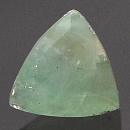|
Click on a letter above to view the list of gems. |
|
|
|
|
|
|
|
|
Tarbuttite
|
|
| | |
| Discovered in 1907. IMA status: Valid (pre-IMA; Grandfathered) | ||
|
| ||
|
Chemistry |
|
|
| |
|
Zn2(PO4)(OH) | |
|
|
Zinc Phosphate Hydroxide |
|
Molecular Weight: |
242.76 gm |
|
Composition: |
Zinc |
53.87 % |
Zn |
67.05 % |
ZnO |
|
|
Phosphorus |
12.76 % |
P |
29.24 % |
P2O5 |
|
|
Hydrogen |
0.42 % |
H |
3.71 % |
H2O |
|
|
Oxygen |
32.95 % |
O |
|
|
|
|
|
100.00 % |
|
100.00 % |
= TOTAL OXIDE |
|
|
|
||||
|
Classification |
|
|
| |
|
Phosphates | |
|
7/B.06-50 | |
|
|
8 : PHOSPHATES, ARSENATES, VANADATES
|
|
Related to: |
Olivenite Group. Tarbuttite Group. May form pseudomorphs after Smithsonite, Descloizite and possibly also Hemimorphite. May alter to Parahopeite. |
|
|
|
|
Crystal Data |
|
|
|
|
|
Crystals typically equant to short prismatic, complex, with many forms, to 2 cm; in sheaflike or saddle-shaped aggregates; as crusts. |
|
|
None |
|
|
|
|
|
Physical Properties |
|
|
|
|
|
Perfect on {001} |
|
|
Uneven/Irregular |
|
|
Brittle |
|
|
3.5 - 4.0 |
|
|
4.12 (g/cm3) |
|
|
None |
|
|
Not Radioactive |
|
|
|
|
|
Optical Properties |
|
|
|
|
|
Colorless, pale yellow, may be brown, red, or green; colorless in transmitted light. |
|
|
Translucent to Transparent |
|
|
Vitreous, Pearly on cleavages |
|
|
1.659 - 1.713 Biaxial ( - ) |
|
|
0.0530 |
|
|
Weak to Strong |
|
|
Very Strong |
|
|
|
|
|
Occurances |
|
|
|
|
|
Geological Setting: |
An uncommon secondary mineral in the oxidized zone of zinc-bearing deposits. |
|
Common Associations: |
Hopeite, Hemimorphite, Smithsonite, Parahopeite, Hydrozincite, Scholzite, Cerussite, Pyromorphite, Descloizite, Vanadinite, “Limonite” |
|
Type Locality: |
Kabwe Mine (Broken Hill Mine), Kabwe (Broken Hill), Central Province, Zambia |
|
Year Discovered: |
1907 |
|
View mineral photos: | |
|
|
|
|
More Information |
|
|
|
|
|
| |
|
|
|
|
Tarbuttite
has been found at these localities: the type locality
at Kabwe (Broken Hill), Zambia. In the Lueca vanadium
mines, Angola. From the Kef Semmah mine, near Sétif,
Algeria. In Australia, on Reaphook Hill, near Blinman,
Flinders Ranges, South Australia; at Broken Hill, New
South Wales. In the Hudson Bay mine, Salmo, British
Columbia, Canada. At an undefined locality in Guangdong
Province, China. The best crystals are from the Skorpion
Mine, Rosh Pinah, Lüderitz District, Karas Region,
Namibia. |
|
|
We
have not photographed our Tarbuttite gems. Please
check back soon. |
